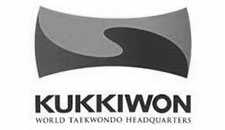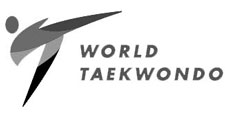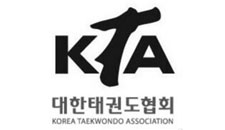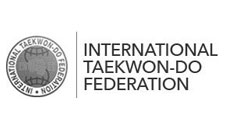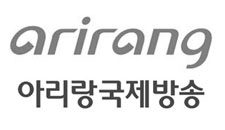Taekwondo 태권도Taekwondo Preschool
Promotion from one geup to the next can proceed rapidly in some schools, since schools often allow geup promotions every two, three, or four months. Students of geup rank learn the most basic techniques first, and then move on to more advanced techniques as they approach first dan. Many of the older and more traditional schools often take longer to allow students to test for higher ranks than newer, more contemporary schools, as they may not have the required testing intervals. View Taekwondo belt levels »
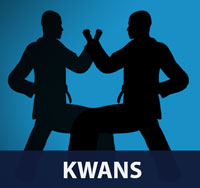
Moo Duk Kwan 무덕관
The original Taekwondo Kwans. In Korean literally means building or hall, but when used in martial arts it can also refer to a school or clan of martial artists who follow the same style and/or leader.
Moo Duk Kwan is the trademarked name of the martial art school founded by Hwang Kee in Korea in 1945. Authorized Moo Duk Kwan schools teach Soo Bahk Do, formerly Tang Soo Do, and earlier Hwa Soo Do. Soo Bahk Do was founded by Hwang Kee, November 9, 1945. Moo Duk Kwan translates as "School of Martial Virtue".
Hwang Kee was inspired to develop his own martial art after having witnessed as a child a man defend himself using the martial art Tae Kyon against a large group of men. Although the Korea Taekkyon Associate disputes Hwang's story, Hwang says that the man refused to teach him, leaving him to devise his own system based on what what he had seen. Traveling between Manchuria and Korea during World War II, Hwang later successfully appealed to Chinese martial arts teacher Yang Kuk Jin for training, fusing together Chinese and Korean martial arts into a form he initially called Hwa Soo Do ("the Way of the Flowering Hand"), altering to Hwa Soo (Tang Soo) Do after the November 9, 1945 opening of a training hall proved unsuccessful. The new name led to greater success.
Hwang Kee further expanded his school of martial arts after in 1957 he was introduced to the Muye Dobo Tongji by a librarian at the Korean National University in Seoul. It referenced the martial arts system of Subak, a bare hands and feet technique. Hwang Kee changed his art to "Soo Bakh Do" on June 30, 1960.
By 1960, Tang Soo Do Moo Duk Kwan was being practiced by almost 75% of all martial artist in Korea, but the art did face challenges particularly in expanding beyond Korea, including attempted mergers into taekwondo. However, in spite of these challenges it eventually spread worldwide, with close to 300,000 practitioners.
After Hwang Kee died on July 14, 2002, his son Hwang Hyun Chul (Jin Mun) was named his successor. His appointment was approved unanimously by the Board of Directors of the U.S. Soo Bahk Do Moo Duk Kwan Federation, Inc. as well as other chapters through the world.
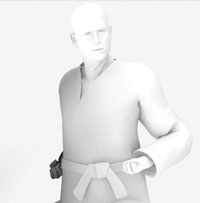
Training Safety Precautions
Overtraining can be described as a point where a person may have a decrease in performance and plateauing as a result from failure to consistently perform at a certain level or training load exceeds their recovery capacity. They cease making progress, and can even begin to lose strength and fitness. Overtraining is also known as chronic fatigue, burnout and overstress in athletes.
It is important to note the difference between overtraining and over-reaching; over-reaching is when an athlete is undergoing hard training but with adequate recovery, overtraining however, is when an athlete is undergoing hard training without the adequate recovery. View Overtraining »
* Please see a certified Master Instructor ( 사범님 sabeomnim ) for training. Proper guidance and instructions are needed to ensure safe training.

Original Taekwondo Kwans ( 관 )
In Korean, kwan ( 관 ) literally means building or hall, but when used in martial arts it can also refer to a school or clan of martial artists who follow the same style and/or leader. On January 8, 1977, nine of the largest kwans unified, recognizing the Kukkiwon 국기원 as being the black belt promotional body for taekwondo. Prior to this declaration, many practitioners had considered their individual kwan certifications as being more valuable than the certificates which were issued by the Kukkiwon 국기원 or Korea Taekwondo Association (KTA). For more information View Taekwondo Kwans ( 관 ) »
There are five tenets defined in the International Taekwondo Federation (ITF) and several more in World Taekwondo (WT).
Indomitable Spirit ( 백절불굴 baekjul-boolgool ): "To have indomitable spirit means to have the courage to stand up for what you believe in, no matter what odds you are up against, and to always give 100% effort in whatever you do." View Taekwondo Tenets »
RESOURCES
This article uses material from the Wikipedia article "Moo Duk Kwan", which is released under the Creative Commons Attribution-Share-Alike License 3.0.







